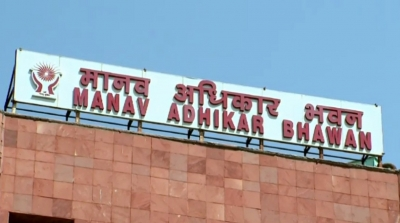NHRC takes suo motu cognisance of drowning of kids in Delhi, Greater Noida
By IANS | Updated: July 16, 2025 17:29 IST2025-07-16T17:21:41+5:302025-07-16T17:29:18+5:30
New Delhi, July 16 The National Human Rights Commission (NHRC) has taken suo motu cognisance of two incidents ...

NHRC takes suo motu cognisance of drowning of kids in Delhi, Greater Noida
New Delhi, July 16 The National Human Rights Commission (NHRC) has taken suo motu cognisance of two incidents of the drowning of two male kids in public places in Delhi and Greater Noida.
The incident in Delhi happened when, reportedly, a 4-year-old boy fell into an open drain and died in the Mahendra Park area of the North-West District.
In another incident, a 6-year-old boy drowned in a water body inside a park in Greater Noida in Uttar Pradesh.
In a press statement released on Wednesday, the NHRC took note of the reported facts that residents had already informed the Greater Noida Development Authority (GNDA) about waterlogging in the fountain area of the park, where this incident happened, but no action was taken by the authorities. Taking note of the news reports, the apex human rights body said the contents of the press reports, if true, raise a serious violation of human rights.
The NHRC issued notices to the Delhi Chief Secretary, Police Commissioner and the MCD Commissioner in relation to the incident that happened in Delhi, and called for a detailed report on the matter within two weeks.
Referring to media reports, the NHRC said that many such cases of death of people after falling into open drains or manholes have happened in the recent past in different parts of the national capital.
Further, in the incident that happened in Greater Noida, the Commission has issued notices to the GNDA Chairman and the Gautam Budh Nagar Police Commissioner, calling for a detailed report within two weeks.
Established under the Protection of Human Rights Act, 1993, the NHRC, an autonomous statutory body, is an embodiment of India’s concern for the promotion and protection of human rights. Its primary role is to protect and promote human rights, defined as the rights relating to life, liberty, equality, and dignity of individuals guaranteed by the Constitution or embodied in the International Covenants and enforceable by courts in India.
The apex human rights body has the power to take suo motu (on its own motion) action based on media reports, public knowledge or other sources, without receiving a formal complaint of human rights violations.
Disclaimer: This post has been auto-published from an agency feed without any modifications to the text and has not been reviewed by an editor
Open in app